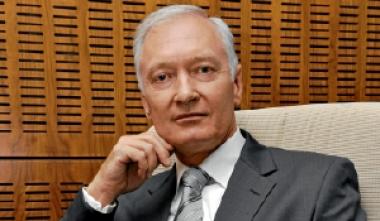Construction boss monster pay in the spotlight
 Construction group, Murray & Roberts paid CEO Henry Laas R14.7m in the financial year to June, including R6.4m in bonuses, even as the construction group’s operating profit declined for the third year in a row
Construction group, Murray & Roberts paid CEO Henry Laas R14.7m in the financial year to June, including R6.4m in bonuses, even as the construction group’s operating profit declined for the third year in a row
South Africans remain alert for overly generous bonus and pension packages paid to senior executives. Salaries in business and government have recently sparked vigorous debate in the country.
Murray & Roberts paid CEO Henry Laas R14.7m in the financial year to June, including R6.4m in bonuses, even as the construction group’s operating profit declined for the third year in a row, and executives failed fully to meet a number of targets to unlock short-term bonuses.
The group’s annual report, released on Thursday, shows Laas received R5.9m in guaranteed pay, R6.4m in short-term incentives and R2.4m in long-term incentives.
His pay was exceeded only by that of Peter Bennett, the group’s head of oil and gas who joined in February 2016.
Bennett was paid R17.6m, of which the largest chunk – R7.3m – comprised compensation for incentives he gave up at his previous employer. He received a short-term bonus of R6.3m.
Nine current and former executives were paid a cumulative R14.3m in bonuses.
The report showed the remuneration committee took five financial performance criteria – comprising 70% of the overall score — into consideration when weighing up whether to award short-term bonuses, and only two of those were exceeded. The rest were met only in part.
"Annual short-term incentives of 52.92% of the possible maximum have been awarded in respect of performance in 2016," Royden Vice, chairman of the group’s remuneration committee, said in the annual report.
"This recognises the group’s financial performance in the current market and the good performance against individual nonfinancial objectives that were set at the start of the year."
Shareholder activist Theo Botha said the targets appeared low and were easily achievable.
"In my opinion, the bonuses are excessive in the light of the poor share price performance," he said. "Operating profits have decreased every year for the last three years. Net profit attributable to shareholders has decreased for the last three years."
Botha said the share price had plunged 60% during this period. On Monday, it was trading at about R10.94.
Of the group’s three major divisions, only two managed to increase profit during the year to 2016. Botha said the net effect was that operating profit for the year was down by R93m.
"Despite this [the executive committee has] been awarding short-term incentives for the last three years."
The order book shrank 12.8% to R33.4bn in the year to June, and only R10.6bn of this amount is near financial close.
But the remuneration committee said in its report that financial measures such as earnings before interest and tax, and the group’s actual profit, were used to calculate bonuses.
Laas, group financial director Cobus Bester and the CEOs of each of its business units have a 70% weighting in favour of financial targets.
"Individual performance is also assessed against suitable objectives related to leadership, relationship, operational and risk [including safety] targets," the committee said.


















